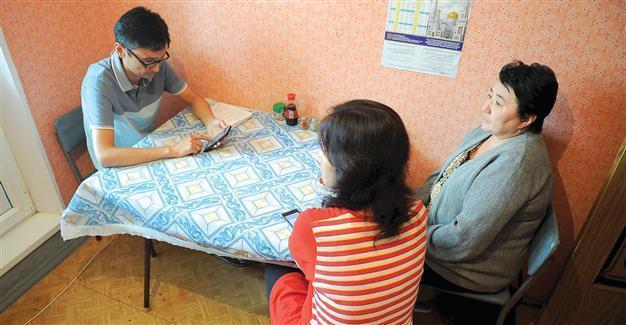Migrant workers in Moscow face discrimination and dangers
MOSCOW - Agence France Press

AFP Photo
Kyrgyz migrant worker Belek Asanbekov sits at the kitchen table of his cramped Moscow apartment, scrolling through pictures on his mobile phone of friends killed days earlier in a fire at work.One of his seven flatmates, Gulbara Boobekova, a 45-year-old mother of two, was minutes away from finishing her 12-hour night shift at a Moscow printing warehouse last month when a faulty lamp set ablaze the four-storey building, killing her and at least 13 other women from the Central Asian country of Kyrgyzstan.
"I called Gulbara, no answer," said Asanbekov, who worked at the printers for more than seven years. "I called again, no answer."
Boobekova is one of the latest victims of lax workplace safety in Russian industries that rely on migrant labour, often from ex-Soviet Central Asia, as employees cut corners to save money with little fear of official punishment.
For the millions of unskilled workers who come to Russia it is yet another hazard they face beyond the daily discrimination, low wages and bureaucratic red tape.
Authorities have pledged to probe the incident and punish those responsible for the blaze, the second major fire that has killed migrants in Moscow this year.
"This is negligence. This is a violation of the fire safety regulations outlined by Russian law," Maxim Reshetnikov, head of Moscow's economic policy and development department, told AFP. "Given the magnitude of this tragedy, the (city's) reaction will of course be harsh."
In January at least 12 migrants from ex-Soviet Central Asia, including three children, were killed when a fire at a sewing workshop caused its roof to collapse.
Russia's prosecutor general said the print warehouse, whose director turned himself in to authorities, had not been inspected for fire safety since 2012.
"They didn't follow safety regulations," said 50-year-old Baktygul Kaldybayeva, a former warehouse employee whose cousin's wife died in the fire.
"Employers don't have to respect safety regulations where migrants work. Why waste money on that?"
The warehouse, which pays employees $1.53 an hour, was popular among Moscow's Kyrgyz because "it paid little but honestly and on time," unlike many other places where migrants work, Kaldybayeva said. The salary of a warehouse worker is less than half of the average wage in Moscow.
Undeterred by low pay and hazardous work conditions, some 550,000 Kyrgyz nationals -- or nine percent of Kyrgyzstan's total population -- have come to Russia to earn money to send home to their families.
Work in their impoverished homeland is rare and remittances from abroad accounted for more than 30 percent of Kyrgyzstan's GDP in 2014, according to the World Bank.
But the absence of legal safeguards make migrants vulnerable to having their pay withheld or their labour rights violated, activists say.
"Employers use not only migrants' unequal situation in comparison to Russian citizens but also their lack of knowledge of the law," said Varvara Tretyak of the Moscow-based Civic Assistance Committee, which provides assistance to refugees and migrant workers.
The committee said local Moscow courts last year had made more than 58,000 rulings to expel migrants while "flagrantly violating the judicial procedure and other norms."
"There are no guarantees at any time," Tretyak said.
In addition to working in hazardous conditions and living in overcrowded rooms or makeshift facilities at their workplaces, migrants also face discrimination that make them vulnerable to attacks, rights activists say. Since January at least 34 people have been injured and four killed in ethnically-motivated hate crimes across eight Russian regions including Moscow, according to the Sova Centre, a research group that studies xenophobia and nationalism in Russia.
"I don't think that a migrant at any time can be safe in Russia from the state and xenophobia," Tretyak said.
Russia's economic situation has also added to the migrants' plight.
The ruble's collapse on the back of Western sanctions and low oil prices coincided with the introduction of draconian migration regulations.
The measures, including a sharp increase in right-to-work fees amounting to 4,200 rubles ($65) a month for migrants from certain ex-Soviet republics, led many Central Asian migrants to leave the country last year.
The new migration regulations are meant to stamp out an old system that was prone to corruption, protect Muscovites' jobs and control the influx of migrants, Reshetnikov said.
In spite of all the difficulties, the Kyrgyz women who perished in the warehouse fire had no choice but to work in Russia, Kaldybayeva said.
"No matter the names they call us, no matter how we are humiliated, people will still come here to work," she said.
"If there was work in Kyrgyzstan, we would work there with pleasure. We would never have come to Moscow."
















